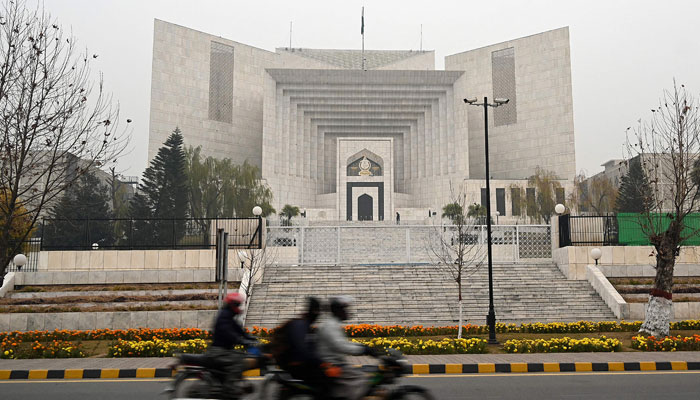A tumultuous tango
Recent speeches by politicians of ruling alliance against judiciary have heightened tensions between judiciary and executive
The showdown between the judiciary and the government continues with no end in sight. Senators belonging to the ruling coalition parties in the centre called upon the judiciary on Wednesday to respect elected representatives and exercise restraint while issuing summons and contempt notices to top officials. Law Minister Azam Nazeer Tarar said parliament is the supreme institution and the people of the country are the creators of the constitution — under which all institutions function. Tarar added that contempt powers should not be used as a “weapon” against politicians. Last week, the Supreme Court had issued show-cause notices to independent Senator Faisal Vawda and Muttahida Qaumi Movement-Pakistan's (MQM-P) leader Mustafa Kamal over their press conferences against Islamabad High Court judges. This week, Vawda sought “contempt proceedings” by the Senate against a sitting apex court judge for calling him as a proxy, allegedly hurting his as well as the House’s integrity.
The recent speeches by politicians of the ruling alliance against the judiciary have heightened tensions between the judiciary and the executive. But are they correct in their outrage against the judiciary? Legal experts say: NO. In fact, by their estimations, the judiciary has instead mostly shown utmost restraint despite being criticized by politicians. Of course, there have been cases in the past where contempt of court against politicians was used in the wrong manner but by and large, judges here have practised restraint over the years. This is an art our political stakeholders may wish to emulate too. Time and again, those in government have been reminded that their focus at the moment needs to be on the economy and governance instead of opening up a thousand different fronts that damage its own cause.
Unfortunately, the government and the ruling party have decided they had rather hone in on micro-problems and issues. The government has unnecessarily gotten into a tussle with the media over the Punjab Defamation Bill, 2024. And this open fight with the judiciary will not help it much either. Many have pointed out that unlike in the past, the current judiciary is more or less quite independent and does not favour any party due to any personal bias. It is unfortunate that the PML-N which fought for the independence of the judiciary is now targeting the judiciary when it is asserting its independence. Obviously, no one is saying that politicians need to be dragged either but for the most part the judges ignoring political speeches and continuing with their work is what has helped the justice system to function. Over the years, we have seen all parties indulge in campaigns against the judiciary when they are not being favoured. We are already perched precariously on the edge of an economic crisis. We already face a debilitating security crisis. Do we really need the judiciary and the executive pitted against each other? This is not something we can afford. What is needed is to ensure that there is no external pressure or interference in the judiciary from any institution and the judiciary should not encroach on parliament’s space either. In Pakistan, where the democratic journey has been tumultuous, striking a balance between the judiciary and the executive is imperative for the consolidation of democracy and rule of law. Both institutions must recognize their respective roles and limitations while upholding the constitution as the supreme law of the land.
-
 Princess Beatrice, Eugenie Are ‘not Innocent’ In Epstein Drama
Princess Beatrice, Eugenie Are ‘not Innocent’ In Epstein Drama -
 Reese Witherspoon Goes 'boss' Mode On 'Legally Blonde' Prequel
Reese Witherspoon Goes 'boss' Mode On 'Legally Blonde' Prequel -
 Chris Hemsworth And Elsa Pataky Open Up About Raising Their Three Children In Australia
Chris Hemsworth And Elsa Pataky Open Up About Raising Their Three Children In Australia -
 Record Set Straight On King Charles’ Reason For Financially Supporting Andrew And Not Harry
Record Set Straight On King Charles’ Reason For Financially Supporting Andrew And Not Harry -
 Michael Douglas Breaks Silence On Jack Nicholson's Constant Teasing
Michael Douglas Breaks Silence On Jack Nicholson's Constant Teasing -
 How Prince Edward Was ‘bullied’ By Brother Andrew Mountbatten Windsor
How Prince Edward Was ‘bullied’ By Brother Andrew Mountbatten Windsor -
 'Kryptonite' Singer Brad Arnold Loses Battle With Cancer
'Kryptonite' Singer Brad Arnold Loses Battle With Cancer -
 Gabourey Sidibe Gets Candid About Balancing Motherhood And Career
Gabourey Sidibe Gets Candid About Balancing Motherhood And Career -
 Katherine Schwarzenegger Shares Sweet Detail From Early Romance Days With Chris Pratt
Katherine Schwarzenegger Shares Sweet Detail From Early Romance Days With Chris Pratt -
 Jennifer Hudson Gets Candid About Kelly Clarkson Calling It Day From Her Show
Jennifer Hudson Gets Candid About Kelly Clarkson Calling It Day From Her Show -
 Princess Diana, Sarah Ferguson Intense Rivalry Laid Bare
Princess Diana, Sarah Ferguson Intense Rivalry Laid Bare -
 Shamed Andrew Was With Jeffrey Epstein Night Of Virginia Giuffre Assault
Shamed Andrew Was With Jeffrey Epstein Night Of Virginia Giuffre Assault -
 Shamed Andrew’s Finances Predicted As King ‘will Not Leave Him Alone’
Shamed Andrew’s Finances Predicted As King ‘will Not Leave Him Alone’ -
 Expert Reveals Sarah Ferguson’s Tendencies After Reckless Behavior Over Eugenie ‘comes Home To Roost’
Expert Reveals Sarah Ferguson’s Tendencies After Reckless Behavior Over Eugenie ‘comes Home To Roost’ -
 Bad Bunny Faces Major Rumour About Personal Life Ahead Of Super Bowl Performance
Bad Bunny Faces Major Rumour About Personal Life Ahead Of Super Bowl Performance -
 Sarah Ferguson’s Links To Jeffrey Epstein Get More Entangled As Expert Talks Of A Testimony Call
Sarah Ferguson’s Links To Jeffrey Epstein Get More Entangled As Expert Talks Of A Testimony Call




